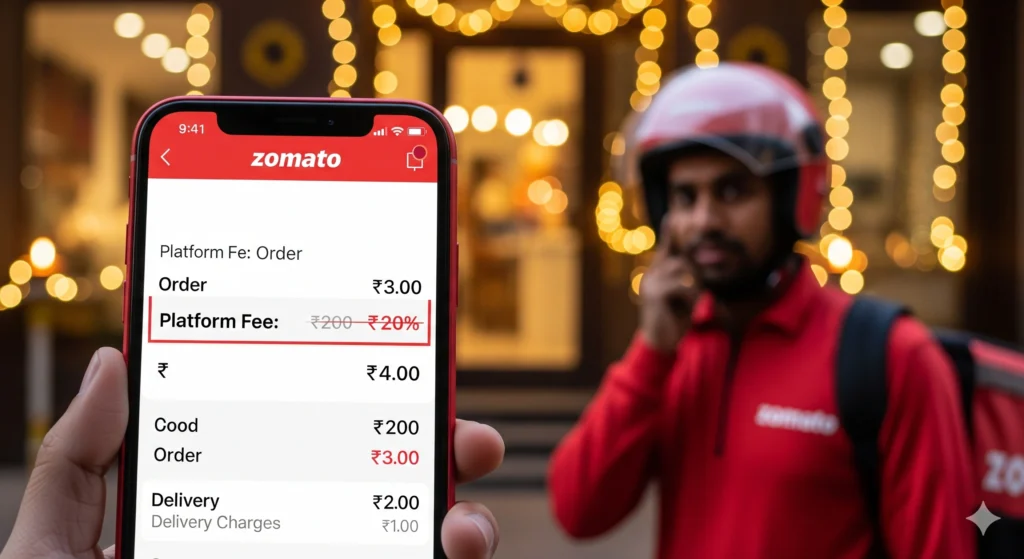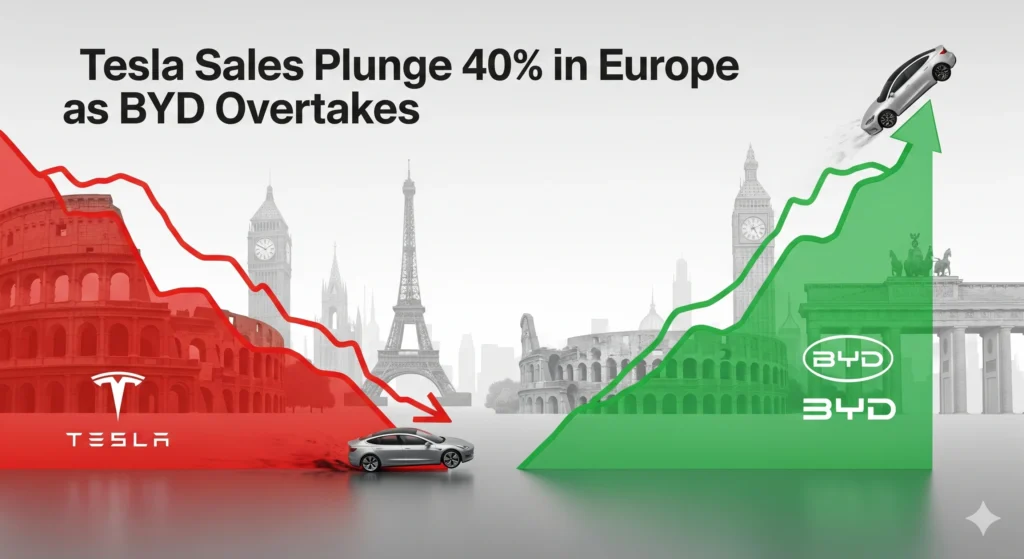AI Overview: Key Takeaways
- Zomato increases platform fee from ₹10 to ₹12 per order (20% hike)
- Timing coincides with India’s festive season (Dussehra and Diwali)
- Rival Swiggy also increasing fees to ₹14 in select locations
- Fee hike expected to generate additional ₹45 crore quarterly revenue
- Comes amid financial pressures from quick commerce investments
- Blinkit (Zomato’s quick commerce arm) now surpasses food delivery in order value
Food delivery giant Zomato has raised its platform fee by 20% to ₹12 per order from ₹10 as India’s festive season begins, marking another strategic move to boost profitability during peak demand periods.
The timing coincides with similar actions by rival Swiggy, which has increased its platform fee to ₹14 from ₹12 in select locations. Both companies are betting that the expected surge in orders during festivals like Dussehra and Diwali will offset any potential customer resistance to higher fees.
Financial Pressure Drives Fee Increases
The platform fee hikes come as both food delivery giants face mounting financial pressures from aggressive investments in quick commerce operations. Zomato’s parent company Eternal reported a dramatic 90% year-on-year decline in quarterly profit to ₹25 crore in the April-June period, despite revenue growing 70% to ₹7,167 crore.
According to industry estimates, Zomato’s daily order volume of approximately 2.3-2.5 million orders means the ₹2 increase translates to an additional ₹45 crore per quarter in revenue. For a company that has steadily raised platform fees from their initial introduction at ₹2 in August 2023, these incremental charges have become a crucial revenue stream.
Customer Backlash and Competition Concerns
The fee hike has sparked significant criticism on social media, with customers questioning the cumulative impact of various charges. “Either Zomato thinks that the consumer is stupid, or they just don’t care anymore,” wrote one user, highlighting that the same order now costs nearly ₹25 more than on competing platforms.
The backlash is particularly acute among Zomato Gold subscribers, who continue paying platform fees despite their premium membership status. This has led to accusations of “daylight robbery” from customers who feel they’re paying extra to pay more.
Market Dynamics and New Competition
The fee increases occur amid intensifying competition in India’s food delivery market. Rapido has launched its new food delivery service “Ownly” in select Bengaluru areas, offering significantly lower commission rates of 8-15% compared to the 16-30% charged by established players.
Ownly operates on a zero-commission model for restaurants, instead charging fixed delivery fees and promising meals at prices 15% lower than major platforms. The service currently operates in limited areas including Koramangala, HSR Layout, and BTM Layout in Bengaluru.
Quick Commerce Growth Overshadows Food Delivery
Notably, this marks the first quarter where Zomato’s quick commerce arm Blinkit surpassed its traditional food delivery business in terms of order value. Blinkit’s revenue grew 154% year-on-year, highlighting the company’s strategic pivot toward instant grocery delivery.
Meanwhile, Swiggy’s losses doubled to ₹1,197 crore during the same period, largely due to investments in its Instamart quick commerce vertical, despite a 54% increase in revenue. The company added 42 new dark stores during the quarter while facing declining orders per store.
As festive season demand is projected to drive quick commerce deliveries to 10% of total e-commerce volume compared to 5% last year, both companies are ramping up operations with 40-60% increases in temporary workforce.
Key Financial Impact Analysis
| Metric | Zomato | Swiggy |
|---|---|---|
| Platform Fee Increase | ₹10 to ₹12 (20%) | ₹12 to ₹14 (select locations) |
| Quarterly Profit/Loss | ₹25 crore profit (-90% YoY) | ₹1,197 crore loss (double previous) |
| Revenue Growth (YoY) | 70% to ₹7,167 crore | 54% increase |
| Quick Commerce Growth | Blinkit: 154% revenue growth | Instamart: expanded dark stores |
| Estimated Additional Revenue | ₹45 crore per quarter | Data not available |


